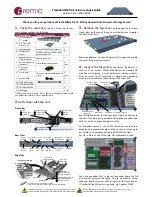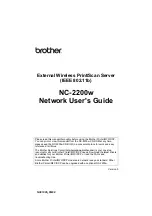
7-8
AlphaServer 8200/8400 Operations Manual
Output is also reenabled when the console prompts for a command, issues an error
message, enters program mode, or when Ctrl/P is entered. It is not reenabled by
displaying a repeat command.
Ctrl/P works like Ctrl/C and is echoed as ^C, if the console terminal is in SRM
console mode. Under the OpenVMS and DIGITAL UNIX operating systems, if the
console terminal is in program mode and is secured, Ctrl/P is not echoed, but is passed
to the operating system for processing. If the console terminal is in program mode and
is not secured, Ctrl/P halts the processor and begins the SRM console program. See
the continue command for additional information. Ctrl/P is not available when the
Windows NT operating system is running. See Section 8.2 for information on how to
switch between Windows NT, AlphaBIOS Setup, and the SRM console.
Ctrl/Q resumes console output to the console terminal that was suspended with Ctrl/S.
Additional Ctrl/Q strokes are ignored. Ctrl/Q is not echoed.
Ctrl/R is echoed as ^R, followed by a carriage return, line feed, and printing the
current command line. Deleted characters are omitted. This command is useful for
hardcopy terminals.
Ctrl/S suspends output to the console terminal until Ctrl/Q is entered. Ctrl/S is not
echoed.
Ctrl/U discards all characters that you entered on the current line. It is echoed as ^U,
followed by a carriage return, line feed, and a new prompt.
* allows wildcarding with device names and environment variables. With the build
command, wildcarding is permitted for a class of device; for example, KFTIA*.
Wildcarding is allowed with the following commands:
•
build
•
clear
•
initialize
•
set -d
•
show
•
show configuration
•
show device
•
show <envar>
•
show network
•
test
Double quotes (" ") allow you to denote a string for environment variable assignment.
# allows you to enter a comment. All characters following the # are recognized as a
comment only. Exceptions include the above control characters.
















































